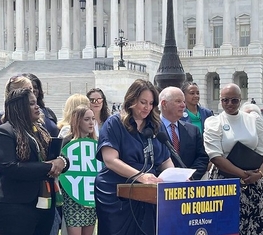Brnovich v. Democratic National Committee
Case Summary
The Supreme Court of the United States upheld Arizona's out-of-precinct policy, which does not allow the counting of ballots cast outside of the voter's designated precinct, and Arizona's ballot collection law, which permits only certain individuals to handle another person's completed early ballot. The LWVUS and the LWV of Arizona filed amicus briefs in the case.
In Brnovich v. Democratic National Committee, plaintiffs challenged two Arizona election laws which disproportionately harm the voting rights of people of color in the state. Under Arizona’s out-of-precinct voting law, a voter who casts a provisional ballot outside their designated precinct will not have their vote counted. Additionally, under the state’s ballot collection law, only certain individuals — family and household members, caregivers, mail carriers, and election officials — may handle another person’s completed early ballot. The plaintiffs argued that both laws violate Section 2 of the Voting Rights Act (VRA), as well as the Fifteenth Amendment, because both the practice of casting a provisional ballot outside of one’s precinct and of third-party ballot collection are used disproportionately by racial minority voters in Arizona, especially Latino, Black, and Native voters.
In January 2021, The League of Women Voters of the United States and the League of Women Voters of Arizona joined separate amicus briefs in support of the plaintiffs challenging the two laws.
The League of Women Voters of the United States’s brief was coordinated and drafted by the Leadership Conference on Civil and Human Rights and WilmerHale, along with 52 national, state, and local organizations.
The League of Women Voters of Arizona was joined by the Arizona Center for Empowerment, Chispa Arizona, and Mi Familia Vota. LWV AZ’s brief highlights the fact that income inequality and racial discrimination in education, transportation, housing, and health increase the odds that Latinx, Black, and Native voters will be disproportionately burdened by the state’s out-of-precinct and ballot collection policies. The League of Women Voters of Arizona is represented by the Brennan Center for Justice and Ballard Spahr.
In June 2021, the US Supreme Court upheld both Arizona voting laws. Justice Alito, writing for the majority, held that Arizona’s out-of-precinct law and third-party ballot collection ban did not violate Section 2 of the VRA and were not enacted with a racially discriminatory purpose. His reasoning was that Section 2 does not equivocate access to voting and the opportunity to vote. Further, he wrote that so long as access to voting remains available, even if that availability is close to impossible, the barriers and the lack of opportunity to actually cast your vote, particularly burdensome for communities of color, are irrelevant to a Section 2 claim.
The ruling constitutes yet another blow to the vital protections of the Voting Rights Act, highlighting the need for federal legislation to restore the full power of the VRA.
LWV Timeline
LWVUS files amicus brief with SCOTUS in support of plaintiffs
The League of Women Voters of the United States joined 52 organizations, led by the Leadership Conference on Civil and Human Rights, in filing an amicus brief in support of plaintiffs in Brnovich v. DNC.
LWVAZ files amicus brief with SCOTUS
The League of Women Voters of Arizona filed an amicus brief with the Arizona Center for Empowerment, Chispa Arizona, and Mi Familia Vota in support of the plaintiffs.
SCOTUS upholds the Arizona voting laws
SCOTUS held that Arizona’s out-of-precinct policy and third-party ballot collection ban did not violate Section 2 of the VRA and was not enacted with a racially discriminatory purpose.





